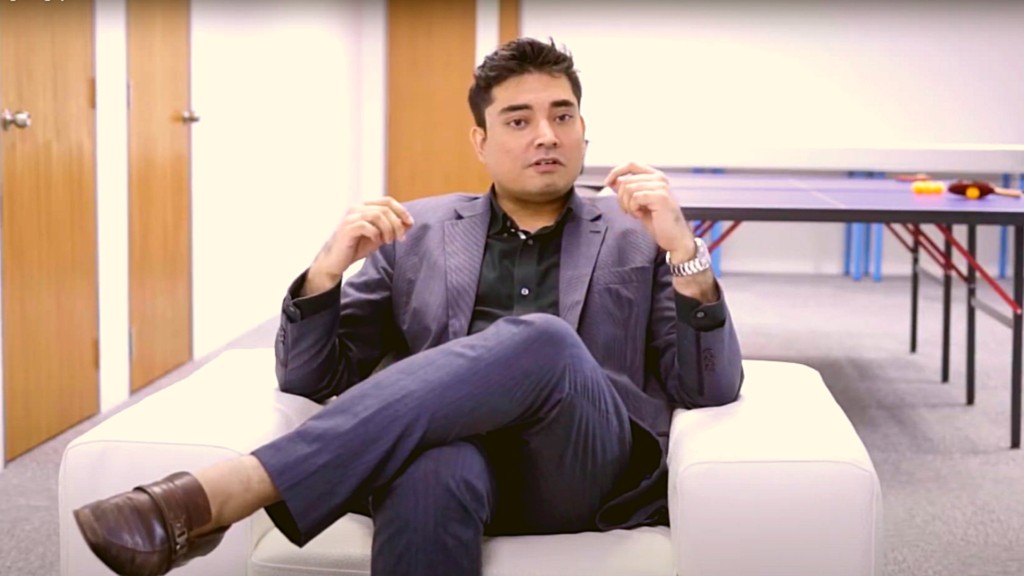The Memory Whisperer: An Inside Look at Sancy Suraj, Memory Coach and Trainer
We all wish to have a better memory, to remember important things and recall important information with ease. That’s where Sancy Suraj, the Memory Whisperer, comes in. Sancy is a well-known Memory Coach and Trainer who has been training memory improvement techniques for the past 12 years. He has thought over 10,000 people worldwide memory improvement techniques and represented Singapore at the world memory championships in 2011. Sancy has also set six memory records, making him one of the most sought-after memory trainers in Singapore and beyond. In this article, we take a closer look at Sancy Suraj and his unique approach to memory improvement.

Can you tell us about your background and how you first became interested in memory improvement techniques?
I have always been fascinated by memory and its workings since I was a child. However, it was not until I came across the book “The Memory Book” by Harry Lorayne and Jerry Lucas that I realized that memory could be trained and improved upon. I started practicing the techniques mentioned in the book, and I saw a significant improvement in my memory skills.
This experience sparked my interest in memory improvement techniques, and I began exploring and learning more about the subject. Eventually, I discovered the world of competitive memory and started training to compete in memory competitions. This led me to study memory techniques more extensively and develop my own techniques, which I now use to help others improve their memory skills.
What inspired you to become a memory coach and trainer, and what do you find most rewarding about this work?
My inspiration to become a memory coach and trainer came from my own experience of learning and practicing memory techniques. I realized that memory improvement is a skill that can be taught and learned, and I wanted to share my knowledge and help others achieve their goals. What I find most rewarding about this work is seeing my clients’ progress.
Witnessing the impact that improved memory skills can have on their lives. I have had clients who were able to pass exams, secure better jobs, and enhance their personal and professional relationships, all thanks to their improved memory skills. Knowing that I have played a part in helping them achieve their goals is incredibly fulfilling.
How do you approach working with clients to help them improve their memory, and what sets your coaching style apart from others in the field?
My approach to working with clients is personalized and tailored to their specific needs and goals. I believe that each person’s memory strengths and weaknesses are unique, and I work with my clients to identify their individual needs and develop a customized training plan. My coaching style is focused on practical application and hands-on learning.
I help my clients understand the underlying principles of memory techniques and teach them how to apply these principles in their daily lives. I also believe in building a strong foundation, so I focus on teaching the basics before moving on to more advanced techniques. I am committed to helping my clients achieve their goals and am always available to provide support and guidance throughout the process.
“I approach memory coaching as a collaborative effort between myself and my clients. By understanding their unique learning styles and personal goals, we work together to develop a tailored plan that not only improves their memory skills, but also enhances their overall cognitive abilities and quality of life.”
Can you share some examples of particularly memorable client success stories, and what strategies you used to help them achieve their goals?
I have had many memorable success stories with my clients. One that comes to mind is a client who was struggling to remember important information at work, which was affecting her job performance. After working with me, she was able to implement memory techniques that allowed her to remember the information easily, and her job performance significantly improved. Another memorable success story is a client who was studying for a medical exam and was having difficulty retaining the vast amount of information required.
Through our coaching sessions, we developed a customized training plan that allowed her to memorize the required information efficiently. She passed her exam with flying colors and was able to pursue her dream of becoming a doctor. In both of these cases, I focused on identifying my clients’ individual needs and developing a personalized training plan that worked for them.
What are some of the biggest challenges that clients face when trying to improve their memory, and how do you help them overcome these challenges?
As a memory coach and trainer, I have worked with many clients who face various challenges in improving their memory. One of the biggest challenges that clients face is the misconception that memory improvement requires a lot of time and effort. Many people believe that they are born with a certain level of memory and that it cannot be improved. However, this is simply not true. Another common challenge that clients face is the difficulty in recalling specific details, such as names or faces. I help clients overcome these challenges by teaching them various memory techniques that are tailored to their specific needs. These techniques can help improve their ability to recall information and strengthen their memory over time.
I also often encounter clients who struggle with a lack of motivation or focus when it comes to memory improvement. This can make it challenging to stick with a memory improvement program and achieve their goals. To overcome this, I work with my clients to identify their personal goals and motivations for improving their memory, and then create a customized program that is designed to meet their individual needs. I help my clients stay motivated by tracking their progress and celebrating their successes along the way.
“Memory improvement can be a challenging journey, but with the right tools and guidance, it can also be incredibly rewarding. As a memory coach, I am committed to helping my clients overcome their unique challenges and achieve their goals. I believe that everyone has the potential to improve their memory, and my job is to provide them with the support, techniques, and motivation they need to unleash that potential.”
Sancy Suraj’s journey to becoming a memory coach and trainer began when he discovered that he had a natural talent for memorization. As a student, he found that he was able to remember vast amounts of information with ease, even when others struggled to do so. He became fascinated with memory improvement techniques and began studying them in-depth, eventually developing his own unique approach to teaching others how to improve their memory.
One of the most rewarding aspects of Sancy’s work as a memory coach and trainer is seeing the impact that his training has on his clients’ lives. Sancy’s approach is highly personalized and tailored to each client’s individual needs, which allows him to help people of all ages and backgrounds to improve their memory. He believes that everyone has the potential to improve their memory, no matter their age or cognitive ability, and he is dedicated to helping his clients unlock that potential.
Sancy’s coaching style is marked by his deep understanding of memory improvement techniques, which he combines with a compassionate and supportive approach. He is always looking for new and innovative ways to help his clients, and he uses his extensive knowledge of memory techniques to create customized training plans that are designed to meet each client’s unique needs.

What are some common misconceptions about memory improvement, and how do you work to dispel them in your coaching?
There are many misconceptions about memory improvement that can make it difficult for people to fully embrace the benefits of memory training. One common misconception is that memory improvement techniques are only useful for individuals with certain types of memory problems or conditions. However, memory techniques can be helpful for anyone who wants to improve their memory, regardless of their age or cognitive ability. Another common misconception is that memory training is boring or time-consuming. However, memory training can be fun and engaging when approached with the right mindset and techniques.
As a memory coach and trainer, I work to dispel these misconceptions by providing education and resources that help individuals understand the benefits of memory improvement and how they can incorporate these techniques into their daily lives. I also emphasize the importance of individualization and tailoring memory techniques to each person’s unique needs and learning style. By breaking down barriers and helping individuals understand the practical benefits of memory training, I can help them overcome any misconceptions and achieve their goals.
What role do memory improvement techniques play in overall brain health, and how can these techniques be used to prevent cognitive decline?
Memory improvement techniques play a crucial role in overall brain health. By training our memory and challenging our brains, we can strengthen neural connections and improve cognitive function. Memory techniques can also help prevent cognitive decline and age-related memory loss. As we age, our brains undergo changes that can impact our memory and cognitive abilities. However, research has shown that engaging in memory training can help slow down or even prevent these changes, leading to improved cognitive function and quality of life.
In addition to improving memory and cognitive function, memory techniques can also help individuals in their personal and professional lives. By improving their ability to recall information and process new information, individuals can boost their productivity, creativity, and overall success. Overall, memory training is a valuable tool that can improve brain health and enhance overall quality of life.
What advice would you give to someone who is just starting to explore memory improvement techniques, and wants to start practicing them on their own?
For someone who is just starting to explore memory improvement techniques, I would advise them to begin by setting realistic goals for themselves. It’s important to remember that memory improvement is a gradual process and it takes time and consistent practice to see significant improvements. They should start by learning some basic memory techniques such as the link method, the peg system or the method of loci and then start applying them in their everyday life. They can start with small and simple things such as trying to remember a grocery list or a phone number, and gradually move on to more complex information such as lectures or presentations.
I would also recommend that they maintain a healthy lifestyle that includes getting enough sleep, exercise and a balanced diet. These factors play a crucial role in brain health and can help improve memory and overall cognitive function. Additionally, they should challenge their brain by learning new things and engaging in mentally stimulating activities such as puzzles, games, or reading. These activities can help promote the growth of new neural connections in the brain, which can lead to better memory and cognitive function.
Finally, it’s important to stay motivated and persistent in their practice. They should set aside some time each day for memory exercises and make it a habit. They can also track their progress by keeping a record of what they have learned and what techniques they have used. Celebrating small victories and milestones can also help keep them motivated and make the learning process more enjoyable.
Looking ahead, what do you see as the future of memory improvement techniques, and how do you plan to continue innovating in this field?
I believe that the future of memory improvement techniques is bright, as there is still much to be explored and discovered in this field. With advancements in technology and neuroscience, we can expect to see new and innovative ways to improve memory and cognitive function. For example, the use of virtual reality and brain stimulation techniques may become more prevalent in memory training.
As a memory coach and trainer, I am committed to staying up to date with the latest research and incorporating new techniques into my coaching programs. I am constantly exploring new ways to make the learning process more engaging and effective for my clients. I also plan to continue collaborating with other experts in the field to exchange ideas and knowledge, and to promote the importance of memory improvement in lifelong learning and brain health.
Finally, can you share any personal tips or techniques that you use to keep your own memory sharp and focused?
As a memory coach and trainer, I place a high value on keeping my own memory sharp and focused. One of the techniques that I use is the method of loci, which involves visualizing a familiar location and placing the information I need to remember in different parts of that location. I also use association techniques, such as linking information to something that is already familiar to me, and repetition to help reinforce important information.
Another technique that I find useful is mindfulness meditation, which helps me stay focused and improve my ability to concentrate. I also challenge my brain by learning new things, such as a new language or a musical instrument, as this can help promote the growth of new neural connections in the brain.
Finally, I prioritize self-care by maintaining a healthy lifestyle that includes regular exercise, a balanced diet, and enough sleep. These factors play a crucial role in brain health and can help improve memory and cognitive function.
“By consistently practicing and incorporating memory techniques into my daily routine, I am able to maintain a sharp and focused memory. However, it’s important to remember that everyone’s memory is unique and what works for one person may not work for another. The key is to experiment with different techniques and find what works best for you, and to make memory training a consistent part of your daily routine.”
Sancy Suraj is a true expert in the field of memory improvement, and his unique approach to coaching has helped thousands of people around the world to improve their memory and enhance their lives. Whether you’re a student looking to improve your study skills or an older adult hoping to prevent cognitive decline, Sancy has the knowledge, skills, and experience to help you achieve your goals. So if you’re interested in learning more about memory improvement techniques or are looking for a coach to help you on your journey, be sure to reach out to Sancy Suraj, the Memory Whisperer.
Click here for more information on our Memory Courses


